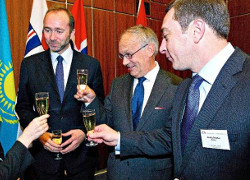Aftenposten: EFTA should not cooperate with Belarusian dictator
10- 7.02.2012, 14:51

Norway is alarmed by the Norwegian government’s connections with Belarus.
An article in the Norwegian newspaper Aftenposten criticizes the agreement between the European Free Trade Association (EFTA) and the Customs Union of Russia, Belarus and Kazakhstan. In the negotiations over the agreement, the EFTA is represented by Oslo.
The newspaper posted a photograph of Norway’s Industry and Trade Minister Trond Giske (second from the left) drinking champagne with Belarus’ Trade Minister Nikolay Snopkov (first from the right), Russia’s Economic Development Minister Elvira Nabiullina and Switzerland’s Economics Minister Johann Schneider-Ammann. The photo was taken in early 2012 in Genève during the negotiations over the agreement on free trade zone between then Customs Union members and the EFTA. The next round of negotiations is to take place in November in Minsk.
According to Aftenposten, Norway should not hold any talks with Aliaksandar Lukashenka’s regime that fakes voting results and throws people to prison and tortures them for their political views.
The newspaper cites Iryna Khalip, the wife of presidential candidate and political prisoner Andrei Sannikov. When she saw her husband for the first time after several months that he spent in the Vitsiebsk prison, she said “he looks like he has spent ten years in Stalin concentration camps.”
Aftenposten also reminds about the harsh confinement conditions of another presidential candidate, Mikola Statkevich.
“The situation with the human rights in Belarus has aggravated since the last year, and we are ready to broaden the sanctions,” an EU diplomat told Aftenposten. It is reported that the EU Foreign Ministers may intensify the sanctions against the Belarusian regime on 27 February.
Meanwhile chief of the international human rights organization Human Rights Watch Jan Egeland expressed his astonishment about the fact that his country represents the EFTA in the talks with Russia, Belarus and Kazakhstan where mass human rights violations are reported on a regular basis. “For example, in Russia the opposition is systematically suppressed, there is neither freedom of speech nor freedom of associations, and Belarus is even called Europe’s last dictatorship.”
“This is a problem, because any cooperation in trade is a signal of willingness to establish tighter contacts with the country,” Jan Egeland emphasized.
Egeland is convinced that Oslo and Brussels must adhere to the politics of maximal pressure on dictatorship.
The Norwegian powers in their turn assert that ”clear statements on human rights” will be added to the free trade agreement. But Aftenposten journalists have thoroughly studied the protocols of the negotiations commission talks and have not found the expression “human rights” at all.
Ulf Sverdrup, the director of the Norwegian Institute of International Affairs (NUPI), said that “it seems that Oslo is signing an agreement on free trade while the EU is broadening the sanctions.”
“The question is, can the EFTA continue the talks in general?” the Norwegian expert points out.
The situation is aggravated by the fact that initially the EFTA has signed a crucial – especially for Norway – agreement with Russia. After the establishment of the Customs Union Moscow demanded that further negotiations should include Minsk and Astana, and Oslo agreed to the demands.
“If everything goes smoothly, the deal will be made next year,” Aftenposten’s sources from the trade authorities remarked.
An interesting fact: in accordance with the agreement terms Norway negotiates both with the entire Customs Union at once and with each country separately.
According to Ulf Sverdrup, “since some of these agreements imply lower social standards than in the EU, doing so the EFTA hopes to obtain a competition bonus in the EU.”
The EFTA was founded in 1960 in order to create a free trade zone. Later the countries that formed or joined the EU left the EFTA. Today the EFTA consists of four countries that are not EU members: Norway, Switzerland, Island and Lichtenstein.










